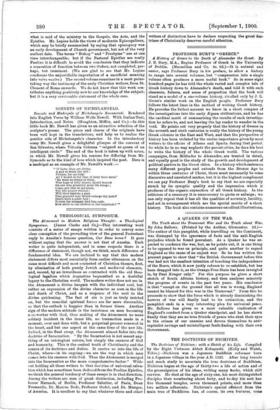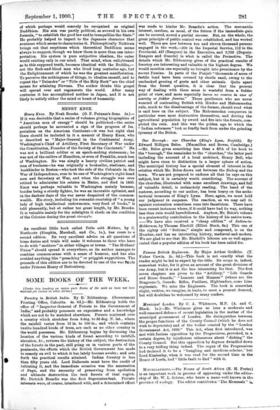THE DOCTRINES OF NICHIVEN.
The Doctrines of Nichiven : with a Sketch of his Life. Compiled by the Right Virtuous Abbot Kobayashi. (Kelly and Walsh, Tokio.)--Nichiven was a Japanese Buddhist reformer born in a Japanese village in the year A.D. 1222. After long travels and much study to ascertain the true doctrines of Buddhism, Nichiven began at the age of thirty-two a life of action and of the promulgation of his ideas, writing many books, which still survive. He died at the age of sixty-one, his most distinguished disciples then numbering about forty, and to-day his sect has five thousand temples, seven thousand priests, and more than two million adherents. Nichiven's special offshoot from the main tree of Buddhism has, of course, its own features, some
of which perhaps would scarcely be recognised as original Buddhism. His aim was partly political, as avowed in his own formula, "to establish the good law and to tranquillise the State." He probably helped to impart to the Japanese character that evenness which seems to characterise it. Philosophically Nichiven brings out that emptiness which theoretical Buddhism seems always to suggest, though we know there is more than one inter- pretation. His system is pure subjective idealism, the outer world existing only in our mind. That mind, when enlightened as to this supposed truth, becomes identical with the Buddha,— not the flesh-and-blood man who lived long centuries ago, but the Enlightenment of which he was the greatest manifestation. To perceive the nothingness of things, to idealise oneself, and to repeat the "Daimoku" or "Title of the Holy Book" are the chief means for attaining Nirvana. The author thinks this gospel will spread over and regenerate the world. After many centuries it has accomplished neither in Japan, and it is not likely to satisfy either the mind or heart of humanity.



































 Previous page
Previous page